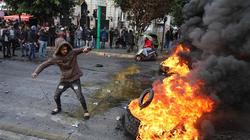 The United Nations says violence caused by “strange groups” in Beirut seems to be politically driven in an attempt to undermine security and stability in Lebanon, which has faced anti-government protest rallies for the past three months.
The United Nations says violence caused by “strange groups” in Beirut seems to be politically driven in an attempt to undermine security and stability in Lebanon, which has faced anti-government protest rallies for the past three months. RNA - UN Special Coordinator for Lebanon Jan Kubis made the remarks on his official Twitter account on Thursday, referring to attacks on security forces and vandalism of state institutions and private property in Beirut during the past few days.
“Nights of violence and vandalism by strange groups targeting state institutions and private properties, waves of attacks on security forces by stones, flares and Molotov cocktails?” the senior UN official asked.
“This looks more like a political manipulation to provoke the security forces, to undermine civil peace, to fan up sectarian strife,” Kubis added, without elaborating further.
1/2 Nights of violence and vandalism by strange groups targeting state institutions and private properties, waves of attacks on security forces by stones, flares and Molotov cocktails??
— Jan Kubis (@UNJanKubis) January 23, 2020
2/2 This looks more like a political manipulation to provoke the security forces, to undermine civil peace, to fan up sectarian strife.
— Jan Kubis (@UNJanKubis) January 23, 2020
His comments come as the unrest in Beirut has deepened the multi-faceted crisis sweeping the Mediterranean country which grapples with financial strains that have sunk the currency, increased prices and driven banks to impose capital controls.
Lebanon has been facing a tough economic situation because of the policies of successive governments, prompting people to hold numerous protest rallies since October 17 last year, when the government proposed imposing a tax on WhatsApp calls, along with other austerity measures.
On October 29, then-prime minister Saad Hariri stepped down under pressure from unprecedented cross-sectarian protests, creating a persisting political void.
In December, Hassan Diab was designated as prime minister. He vowed to form a government made up of “independent specialists” who did not belong to political parties.
However, the 60-year-old former education minister failed to form such an ideal government due to political divisions and jockeying for power, leaving the country with no choice other than having a caretaker government.
Nevertheless, Diab, a self-professed “technocrat”, announced on Tuesday that he had managed to form his government, saying it was made up of 20 specialist ministers backed by the country's political parties.
He also described his cabinet as a technocratic “rescue team” that would work to achieve the goals of protesters.
The formation of the new government under the new prime minister came after the Lebanese Hezbollah resistance movement and its allies agreed on a cabinet that must urgently address the economic crisis and ensuing protests that toppled its predecessor.
According to Press TV, some 400 people sustained injuries during intense clashes with security forces in Beirut on Saturday evening, prompting Human Rights Watch to condemn what it called “the brutal use of force unleashed by Lebanon's riot police against largely peaceful demonstrators.”
The intensity of skirmishes also prompted President Michel Aoun to meet security chiefs on Monday to work out a plan for security measures that need to be taken to preserve peace and stability in Lebanon.
The anti-government demonstrators blame the faltering economy on widespread corruption and abuse of privileges among politicians as the national debt hovers around $85 billion.
Successive governments have also proved to be even incapable of addressing a waste management crisis or improve the electricity grid, which is plagued by daily power cuts.